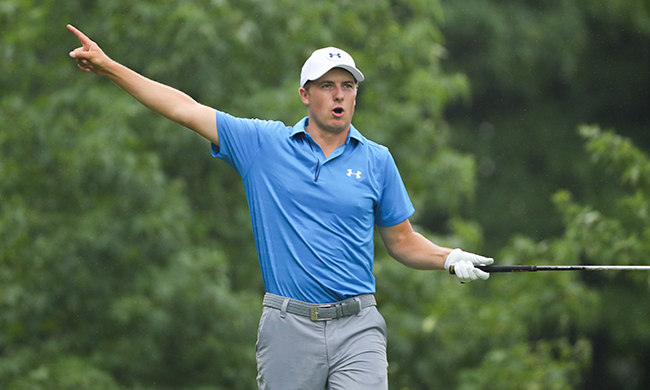NEWS
Why everybody talks to golf balls that don't listen

I do it.
So do you.
Jordan Spieth, oh boy does he ever.
There’s no cause for pride or shame.
Sure, it’s somewhat silly when analyzed or examined. But good luck stopping. Don’t even try.
For a golfer, it’s impossible to play 18 holes and not utter one word at the ball, even though a dimpled sphere with two ears remains as elusive as a par 5 ace.
That’s right, head to your favorite course, hit all those shots and never say: “Get Up! Get Down! Carry! Bite! Don’t Plug! Kick Right! Kick Left! Go in! Oh, Baby!" or ... "Be The Right Club today!"
Can’t be done.
GOLF TIPS: Practice vs. a pre-round warm-up
But guess what? Don’t sweat it. That’s what the expert says anyway.
Bob Rotella is golf’s top sports psychologist. He’s sold millions of books trying to help those just crazy enough to play this wonderful game. He’s counseled Rory McIlroy, Padraig Harrington and Darren Clarke to major championships.
A fine player in his own right, Rotella is one of us, talking away at an inanimate object that wouldn’t listen if it could.
“We like to pretend that we can control it,” Rotella said.
But why? Is it not nuts to attempt to exert control over an object that’s flying away from us at a hundred miles an hour? And furthermore, doesn’t that very act of screaming instructions go against everything mental coaches have preached for years about focusing on the process and not the results?
“You want to yell at it once in a while,” Rotella said. “It’s kind of a fun part of the game. It’s lighthearted. It’s not something that I’d worry about.”
Case in point: Mr. Spieth, world No. 4 and two-time major champion.
Folks say less to each other on first dates than Spieth says to his ball during one shot.
Rotella doesn’t work with Spieth, but admires his mental approach. He’s not fazed by the incessant in-flight chatter.
“He does a great job of being into his target and playing the game for sure,” Rotella said. “And whenever it lands, he does a great job of getting it into the hole.”
Actually, the talking might prove Spieth has mastered his pre-shot routine. Rotella, like many mental coaches, urges strong visualization skills as an integral piece of a player’s preparation.
“To some degree, if you think about it, when you’re visualizing a shot it’s like it’s a live thing,” Rotella said. “This golf ball, we can demand it to do whatever we want it to do in our mind. It’s not shocking that we think we can control it once it’s in the air.”
There is one tenet of talk that might concern Rotella, however. Deprecating discourse is discouraged. Screaming for the small, round dimpled friend to go in the water, bounce out-of-bounds or plug in a bunker could reveal deeper issues.
RELATED: How to hit a bunker shot from a downhill lie in three easy steps
“If a player is yelling at his ball, mad at it, he’s probably frustrated and that would need to be addressed.”
As far as anyone can tell golf is the only sport where such a monologue is commonplace.
It’s funny though.
A golfer can talk to his own ball. But no one else’s. Not even one belonging to a partner. This is a peculiar relationship. Only the one who swung the club can impart the instructions. There’s no way the ball would listen to anyone else. Any loose talk might even anger the golfer. Such was the case in a mid-90s Tour event when a crusty veteran pro told a too-eager-to-speak rookie caddie: “Get your mouth off my ball, son.”
Silence.